Our Stories
Kilifi Kids is making a difference in people’s lives everyday. Read more about how we are changing lives on a person-by-person basis.
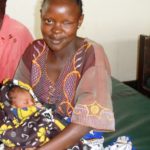
Martha’s Story: The Right Care at the Right Place even during a Strike
It is a dusty, dry day in Kilifi as a mother walks to the clinic for delivery. Martha (a pseudonym) is brave, making this journey despite knowing that the clinics are on strike.
Read More
For the last six weeks in Kilifi and across Kenya, the government clinic nurses have been on strike, requesting the chance to be recognized as a worker’s union. Because of the strike, nursing staff at the clinics was reduced to bare minimums and all facility activities were virtually stopped.
Martha is only 29 years old and has already lost 3 babies in delivery. Previously, she had given birth at home with the help of family members, who were ill-equipped when the deliveries became complicated. Before making the decision to walk miles to the clinic time, Martha was visited in recent months by a community health worker (CHW) who was trained by Kilifi Kids and equipped with a cell phone. That CHW was Martha’s advocate and monitored Martha’s progress with a cell phone. She explained the value of a clinic-based delivery and her ability to receive expert care, and even a referral to an advanced hospital if emergency care was needed.
As Martha arrived at the clinic, she is greeted by the only nurse who is on site during the strike, a young woman named Paris. As a part of Kilifi Kids’ work, clinic nurses now use an electronic dashboard to keep track of pregnancies in their communities and have advance warning of pending births. Even though Paris is supposed to be turning away patients, she is moved with compassion when she sees the mother arrive. She rushes her into the maternity room, and prepares for delivery. After a few moments, we hear fresh cries of the new-born baby, and a new little baby boy is born.
Martha is overjoyed as she sees her son for the first time, and sings the praises of Paris for her health and support. This is the goal we work towards at Kilifi Kids: seeing mothers and newborn babies born in clean, safe facilities under the care of a trained expert.
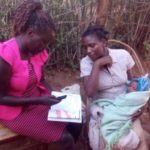
In Her Own Words: A Mother from Kilala Village
I am a 26 year-old mother from Kilala village [in Makueni County, Kenya] and am a small-scale farmer. In my village, people didn’t believe in visiting the hospital, especially pregnant women.
Read More
Initially, there was a traditional “birth attendant” we used to consult when one got sick. Visiting the hospital was a problem, especially in the first trimester; more so, the health facility which is five kilometers away. Only few managed to visit due to the distance and lack of transport. For one to access the health facility, one has to spend 500 Kenyan Shillings [USD $5].
In 2016, I conceived but never knew that I was supposed to attend antenatal clinics. Previously, I delivered at home. One day, I was approached by a community health volunteer [trained and equipped with a cell phone by Kilifi Kids] in my household. She encouraged and talked to me on the importance of attending antenatal clinics, where I would get varied services concerning my pregnancy. She even offered to escort me to the facility.
I was asked to go for an antenatal clinic profile, which turned [out to be] okay but my blood pressure was very high and the nurse even noted that I had started to develop edema. The nurse suggested that I should attend the antenatal clinics frequently for blood pressure monitoring. Then I was put on anti-hypertensives [drugs] but there was no drop in the blood Pressure. I thank the community health volunteer for always reminding me on the importance of the clinics using their mobile phone.
Some days after my second antenatal clinic visit, my fetal movements reduced, and I was sent for an ultrasound. The findings were encouraging and sometimes discouraging because it was a twin pregnancy—both girls. I was overwhelmed with joy but, unfortunately, I was informed that I had an intra-uterine fetal death of one of the twins while the other one was still alive. I got so discouraged but the community health volunteer encouraged me. I had to undergo a caesarian section at 29 weeks of pregnancy to save the life of the living baby and mine too. The baby was incubated for one month and, on reaching 1.8 kilograms, we were discharged.
The community health volunteer kept on visiting me at home for more advice and elaboration of the prescriptions on discharge. She helped me on how to use the kangaroo- mother-care method and when to take my baby to the health facility for immunization and child welfare. I was also advised on nutrition, so as to boost the immunity and weight of the baby. The community health volunteer does follow ups [based on Kilifi Kids’ monitoring system] and makes sure the baby is healthy and free from illnesses. My baby is now 8.5 kilograms. Thank you Kilifi kids for your help.
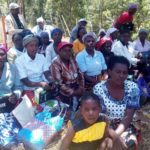
In Her Own Words: A Community Health Worker from Mbuini Village
I am a 45-year old mother, from Mbuini village and a small-scale farmer. I joined the community unit in the year 2011 as a community health volunteer. Initially, data was written on papers, which was expensive and a tedious activity. Sometimes my reports were misplaced and lost.
Read More
Following up with my clients, I was forced to walk several kilometers in order to reach their households to notify their scheduled visit.
Since Kilifi kids joined us, my work has been easier. I was given a mobile phone for which before I had none. Now, I can communicate with my clients faster and send reports on time. The most encouraging [fact] is that I am able to track my patients and receive clinics notifications of upcoming appointments for pregnant mothers and under-five children under my care. When scheduled visits for my clients are near, I am able to call and remind them of their visit. I am also able to track pregnant mothers’ and babies’ health as well as early detection of any complications that may arise such as danger signs. I am confident to say that the program has contributed more in maternal child healthcare.
I have a testimonial of a mother who used to deliver at home. Her first baby died due to prolonged labour. After the mobile training, I was notified of her subsequent pregnancy and I decided to visit her and advised on attending ANC clinic. Unfortunately, she wasn’t willing to attend. I revisited her again and later, she agreed and registered her in the medic mobile platform. I was able to follow her appointments through my mobile phone until she delivered in the health facility. Currently, the child is under [the care of] the Child Welfare Clinic in Mbuini Health Facility. The child is now under good health.
Kilifi Kids team also gave us solar panels, which have eased my volunteer work in the village because I am now able to light my house and charge my mobile phones, including family members and neighbors. Before the program, I was using kerosene to light my house, which was very expensive then. Now my children can study for longer hours than before.
Trainings conducted by Kilifi Kids have increased my knowledge and enabled me to address many problems in my village. I was enlightened on prevention of diseases, nutrition and maternal child health. Using my phone, I can refer my patients to hospital after identification of diseases and they feel appreciative when I link them with health facility staff. I am forever grateful to Kilifi Kids for the great step.
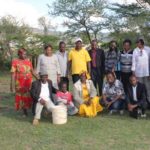
In Her Own Words: A Future Mother and Fruit Vendor from the Kilala Market
I am 34-year old mother who has a lot of joy since I am expecting my only child. Currently, I am a fruit vendor in the Kilala market and glad to tell my story.
Read More
I have had two previous failed pregnancies. I lost my first and second child after a few days of home delivery. It was during this period of societal neglect that I met a community health worker [trained and equipped with a mobile phone by Kilifi Kids] who had been conducting her household visits. I opened up to her about my desperate situation. She encouraged me and told me that it was possible to have healthy babies and introduced me to Maternal and Child Healthcare [Health Ministry-sponsored booklet]. I was surprised because in my previous pregnancies I only visited the village mid-wife. She told me that hospitals were not for the other sick people but also for pregnant mothers too. I was afraid to visit the health center because I was naïve to health care services but she offered to take me to my first hospital visit.
At the health facility, I tested positive for pregnancy and HIV/AIDS. The doctor related my previous failed pregnancies to my HIV/AIDs status. I was shocked and in denial but the community health volunteer helped me to self-accept and told me it wasn’t the end of life. I was put under anti-retroviral therapy and [enrolled in the] antenatal clinic. The nurse educated me on the various medications that I will get at the hospital like tetanus injections, iron, and folic acid tablets and gave me a mosquito net that I should sleep under in order to be protected against malaria.
I have benefited from Community Health Volunteer work since they have always been giving me alerts [from their mobile phone] on attending Antenatal visits in my local health facility. During the visits, I was counseled on the importance of having an individual birth plan that shows me how to have a reliable means of transport to the hospital, identifying the hospital to deliver, and the identification of my birth companion. The community health volunteer also gave me health education on the importance of having a well-balanced diet and the general danger signs of pregnancy like bleeding and reduced baby movements.
I am now in my third trimester and feel very healthy. This is unlike my previous pregnancies, where I had experienced constant fatigue, fevers, and lack of appetite with a significant weight loss. I am confident with the help of God Almighty that this time round I am going to give have a healthy child.
I take this great opportunity to thank the community health volunteers for supporting me through Kilifi Kids program. May God continually bless you. Thank you very much.
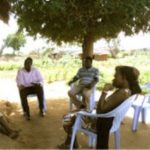
Meet Lillian, a Nurse, at Ganze Making a Difference in her Community
Meet Lillian, a nurse at Ganze Health Facility of Kilifi County, Kenya. It is exactly 8:30 in the morning at the Mother and Child Health (MCH) wing. The room is very noisy with the cries of the infants and small children who are waiting for immunizations.
Read More
Lillian starts by arranging for the women with varied concerns to sit on their respective benches to avoid overcrowding. The mothers and their children far outnumber the antenatal mothers (ANC), so most of them must stand in line for available seating.
“Before we begin, make sure you have your MCH Booklet every time you visit a health facility and show it to the health worker. We do appreciate your cooperation and understanding of the importance of coming for the clinic appointments. Keep the good spirit and make sure you continue coming for the rest of the appointments,” Lillian announced. The whole crowd cheered and clapped heavily.
When asked about whether the program has improved ANC and Immunization uptake in Ganze, Lillian responds, “honestly, it has really increased the attendance in the antenatal care and immunization uptake. The number of home deliveries has declined as more mothers are now educated and see the need to come to the facility. Our workload has increased with the new traffic; more women come every day, at all hours. Kilifi Kids’ project work in Ganze District and Kilifi District has really created wonders and we are glad for the improvement.”
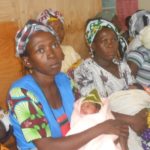
Helping Mwadzuma and Other Pregnant Women Like Her in Kilifi District
From an unnamed nurse in Kilifi County:
Read More
“I am seated at the consultation room of one of the busiest health centres at Kilifi district cheerfully attending to pregnant women who have come for ANC (Antenatal Clinic). There are 10 of them in the waiting bay. So far, I have seen 5 of them and am happy with the number that has attended the clinic today. I am a nurse and this is what we love doing. There is no greater joy than the one of seeing a happy mother holding her healthy newborn baby. I clearly understand the pivotal role of effective ANC. Just next door is a queue of about 30 women with their children waiting at the Child Welfare Clinic (CWC) room for immunization and growth monitoring of the children. A few metres away is a young man with a large register book on the table, surrounded by about 20 people waiting to be served.”
Sister Chaka, a fellow nurse, walks in. She is visibly happy as she greets the woman I am attending to, then turns her attention to me for the report: Mwanawali is 29 years of age. She is 5 months pregnant, her blood level (HB) results are out and reading 5.0g/dl. This is her eighth pregnancy; she lost the last 2 babies at around 28 weeks of pregnancy and was admitted once in the hospital because of severe anemia. She has delivered all her babies at home. Her current weight is 46kg; blood pressure is relatively low; no bacteria, sugar or protein in urine. She neither has syphilis nor HIV/AIDS. Sister Chaka chuckles and lovingly pats Mwadzuma’s back as she says: “Mwadzuma, am glad you came.” She goes on to explain how most pregnant women in this region do not attend ANC. They prefer to deliver their children at home with the help of traditional birth attendants (TBA). She continues, “The women do not understand the importance of medical checkups during pregnancy. Actually, they do not appreciate the importance of taking precaution against diseases; to them, hospitals are for the sick!”
Maternal mortality is the worst nightmare in any clinician’s mind. Research has shown that with effective antenatal clinic visits, 99% of all the risks that lead to death of a pregnant woman are prevented. If she delivers at a health facility under the supervision of qualified health professional, the risk is further reduced by 0.8%. Maternal deaths are therefore almost completely preventable through simple cost effective approaches that are incorporated in effective ANC visits. Most of the pregnant women who seek ANC services are referred by community health workers (CHWs), who consistently encourage them to attend these clinics and follow them up for revisits. These women need constant reminders and follow up for them to come for the clinics, a role that the CHWs are playing excellently. The CHW identifies the pregnant women, sends a short message text (SMS) with a mobile phone to the health facility for registration and refers the woman to the health facility for ANC.
The nurse on hand sees Mwanawali and schedules the appointment date for review using the Kilifi Kids’ system. Just before the appointment day, the computerized system at the health facility will send a text message to the field mobile phone asking the CHW to go and remind that patient to attend her antenatal clinic appointment. This tool has not only increased the number of women attending ANC but, more importantly, has led to a dramatically larger number of revisits for ANC. Because of this new system, nurses like Sister Chaka and others will have more to smile about and know they are making a real difference in their clinics.
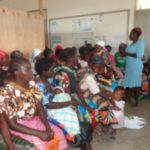
Showing Impact to a Packed Room of Mothers
It is early morning at the Ganze Health Facility, where many women were in attendance—whether pregnant, holdin infants, or struggling to keep their young children still—to learn more about childcare and healthy living.
Read More
The small room was packed to the brim and very noisy. As the special session began, those in the room exhibited genuine curiosity as a nurse spoke of the importance of antenatal care and immunization.
“What would I do if I missed my appointment to the clinic,’’ asked Mama Kanze. The nurse in response gave an answer. Thanks to the introduction of mobile phones, community health workers (CHWs) were now given reminders by the clinic via a text message to check-in with their patients about their future appointment dates. Hearing this news, the crowd seemed quite pleased and immediately lost itself in the discussion about the role technology now plays in their community. As the day began, the facility nurses for that day arrived and began to prepare vaccine —transferring them from the fridge to small coolers. They then started their daily schedule on immunizations and antenatal attendance and worked their way through the room, complete only a few hours later.
One of the nurses in the room reflected: ‘‘over 100 pregnant mothers and the children recently came to our clinic after the CHWs had visited their homes and they reported back by text message.” The SMS network brought relief and efficiency as fewer appointments were missed. Texting also saved the nurses and staff travel time, by eliminating the need to hand deliver reports to the District Hospital. The nurse was proud to announce that the number of attendance of children on immunization increased from 25% to 80% across the District and that the maternal mortality rate has decreased in the communities. With these remarkable results of the project, it proves that mHealth, in all its simplicity of cell phones and text messages, works miracles in improving health care.
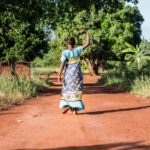
Even Short Distances Can Be the Determinant of Life or Death for the Sick
The Kilifi Kids team is sitting under a tree at a family shamba (farm), listening to the story of how families in Kilifi struggle to access healthcare. Recently, Fatima, who is 24, recognized that her 3-year- old son, Mohammed, was not recovering from pneumonia.
Read More
He had returned from a visit to the Ganze clinic the week before with medicine for pneumonia but he had not responded to the treatment. Within a few hours, his condition continued to go downhill and Fatima decided to take him back to the clinic. At the clinic, the nurses immediately referred him to the central hospital given his critical condition. There are no emergency vehicles at the clinic and so Fatima needed to find the funds to pay for a trip into town. Her family own about 20 acres of land and are small-scale farmers. They have very limited access to funds, and did not have the $10 on hand to pay for transport. Fatima only option was to seek assistance from anyone willing to help. Her closest option was her nearest neighbor. Luckily, he agreed to lend them the transport fees, at an interest rate of 10% per week. For a family that only earns $10 per month, this interest rate was too high, but the choice for Fatima was simple – the life of her child or refusing the loan. She chose the life of Mohammed. He had contracted a severe case of malaria and arrived to the hospital just in time.
As part of our Kilifi Kids’ suite of services, we offer a SMS-based transfer system that make it possible for patients to arrive in time for care and recognize warning signs more quickly for referral. In the future, we can avoid such life-and- death situations like that of Mohammed’s through improved clinic communications and advance planning and create more happy stories for our communities.
